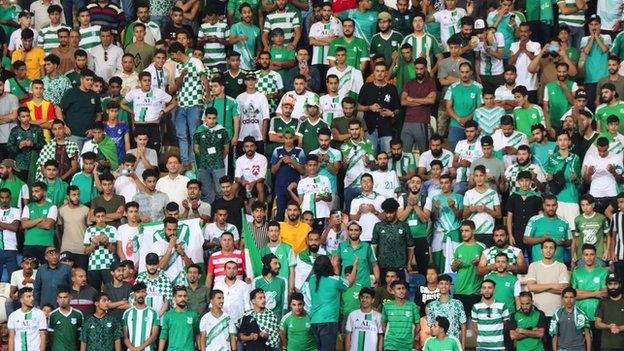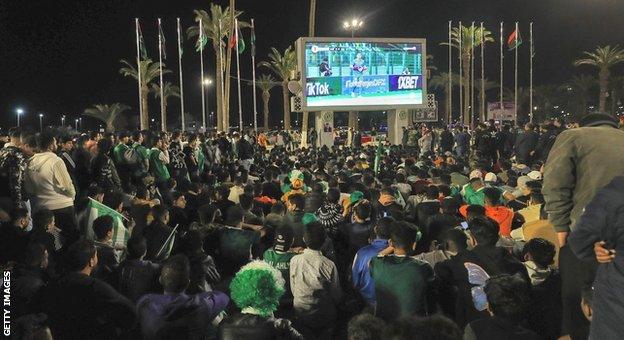Libyan fans embrace return to stadia after ban on attendances lifted
- Published

Al Akhdar fans saw their side through the first preliminary round of the Caf Confederation Cup
For Libyan football fans, the wait to cheer on teams involved at Africa's highest level from the stands has been a long one.
For over nine years, they had been deprived of watching their clubs in continental competition and the national team inside stadiums.
During that time, supporters had to content themselves with a diet of domestic Libyan league games and following training.
Yet the hungry crowds have finally returned for their banquet of African Champions League and Caf Confederation Cup ties this season after the Libyan Football Federation (LFF) succeeded in lifting a ban imposed on attendances.
"Encouraging my football team and supporting it from the stands is a priority for me in this life - I was deprived of that connection for years," Al Ahli Tripoli follower Moad Al-Wensy told BBC Sport Africa.
"Returning to the stands can be described as the feeling of an imprisoned person, who is suddenly given the freedom to practise what he loves the most on the day he is released."
Despite the absence of fans for security reasons as well as the coronavirus pandemic, Libyan clubs made good progress in the Confederation Cup last season, with Al Ahli Tripoli reaching the semi-finals after beating Al Ittihad in an all-Libyan last-eight tie.
On that occasion, followers of both clubs had to watch the derby from their homes, cafes or other public spaces such as Martyrs Square in the capital city.
Since Libya was barred from hosting matches, initially because of the civil war that broke out in 2014, Libyan clubs have used neutral venues to host their matches while the The Mediterranean Knights have played 'home' World Cup and Africa Cup of Nations qualifiers across the continent.
Libya played their first game at home in eight years in 2021 after Fifa lifted its ban previously issued because of the country's civil unrest, although it was not until this season that the Confederation of African Football lifted its suspension regarding continental club matches.
'A special title'

Some fans watched April's Caf Confederation Cup game between Al Ahli Tripoli and Al Ittihad in Martyrs Square, Tripoli
Buoyed by their return, Al Ahli fans will need to make their presence felt this Saturday, when the club hosts Sudan's Al Merrikh in the second leg of their African Champions League second preliminary round tie.
A place in the group stage is at stake, with the visitors bringing a 2-0 aggregate lead following the first leg in El Obeid last Friday.
For Al Ahli and Libya defender Ali Maatouk, the return of supporters - which could boost the team's chances - is a "happy" occasion.
"It will represent a strong motivation for us in the Champions League competition, especially since we are heading into an important confrontation against Al Merrikh," the 34-year-old added.
It was not quite so good last month for fans of fellow Tripoli club, and Libya's most successful side, Al Ittihad, who exited the Champions League on away goals despite a 2-1 win over Burundi's Flambeau du Centre.
But many are simply happy to be back, whatever the results.
"We can really say that we were crowned with a special title - the decision to allow us to return to the stands," supporter Ahmed Belhaj said.
"We only enjoy football in the stands and we have an important role to play, which is to support Al Ittihad and the national teams.
"The nightmare of traveling outside Libya in order to support my club and the national team has ended."
Benefit to Libya?

Libya last appeared at the Nations Cup when failing to go past the group stage in 2012
The return of supporters is also expected to boost Libya's hopes of qualifying for the 2023 Africa Cup of Nations.
Fans watched on in Benghazi as Libya beat Botswana 1-0 in early June to win their opening qualifier and after two games the north Africans are third in Group J, a point behind leaders Tunisia while trailing Equatorial Guinea on goal difference.
Qualifiers resume in March, with the Libyans aiming to reach the finals for the first time since 2012.
"I remember the Botswana match in the Nations Cup qualifiers, which is the first international match that I played in the presence of supporters," Al Ittihad's Libya international Omar Al-Khouja said.
"It will remain in the memory because it was a special atmosphere. The return of the fans is a great motivator for us, and their presence in the stands gives us strength."
Tunisia and Equatorial Guinea will both visit Libya next year, with hopes that Libya can upset two teams who reached the quarter-finals at this year's Nations Cup in Cameroon.
"With the team facing Tunisia in Libya, the fans represent a milestone," Libya defender Maatouk added.
"Their presence means a lot to us on various levels, and we hope that having them there will continue in all competitions locally and internationally."
Mohamed Gremida, an LFF official, said the organisation had worked "extensively" on an issue of "great importance" to get fans back in stadia, pointing out the key loss of gate receipts for both club and country while the ban was in place.
"I thank all the government and security agencies that gave us the necessary support to achieve this," Gremida told BBC Sport Africa.
"Football is always fun with the presence of the public, a cornerstone of the game.
"The absence from the stands also deprived the clubs and the LFF of reaping financial gains that help the clubs, and represent a stable income for them in light of the crises they are experiencing due to different circumstances.
"This made the Ministry of Sports, the LFF and the Ministry of Interior hold continuous meetings in order for the public to return to the Libyan League after an absence of more than two seasons because of the conditions in the country and then coronavirus.
"The return of the masses in full capacity to stadiums gives many positives. It [provides] a great motivation for the players and a level of mass support instead of playing in empty stadiums dominated by silence."